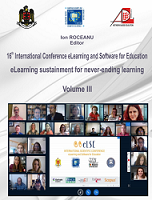COMPUTER-ENHANCED LEARNING OF ROTOR SPINNING
COMPUTER-ENHANCED LEARNING OF ROTOR SPINNING
Author(s): Mariana IchimSubject(s): Business Economy / Management, Higher Education , ICT Information and Communications Technologies, Distance learning / e-learning
Published by: Carol I National Defence University Publishing House
Keywords: Computer-enhanced learning; rotor spinning; digital tools; web-based learning module;
Summary/Abstract: Over the last decades, computers have significantly impacted every aspect of our personal and professional lives and have proven to be vital in many fields of activity, including in education. The growth of smartphone, tablet, and laptop ownership and affordance has increased the interest to integrate computer technology in teaching and learning strategies. Digital education is becoming more and more popular. New interactive digital applications in combination with traditional in-class teaching and learning approaches can notably enhance the learning experience. Digital tools used in or outside the classroom, before or after lecture, online or off-line change completely the way students learn. Their efficient use in the teaching process captures students’ attention, facilitates dynamic interaction, increases students’ motivation and interest in the subject area, and improves the level of subject understanding and learning efficiency. The computer-enhanced teaching and learning allow students to construct their own knowledge and meaning based on their experiences so that students are active agents in the knowledge acquisition process. In this paper a web-based educational module designed for rotor spinning teaching and learning is presented. The web-based learning module contains a diverse range of multimedia tools such as text, schematic drawing of rotor spinning machine, images, animation, videos, and assessment tests with the aim to provide the content in various forms that can be seen, heard or read, thus making the study material easy to understand by a wider range of students with different learning styles. The learning module is meant to supplement the traditional face-to-face instruction.
Journal: Conference proceedings of »eLearning and Software for Education« (eLSE)
- Issue Year: 16/2020
- Issue No: 03
- Page Range: 317-323
- Page Count: 7
- Language: English

